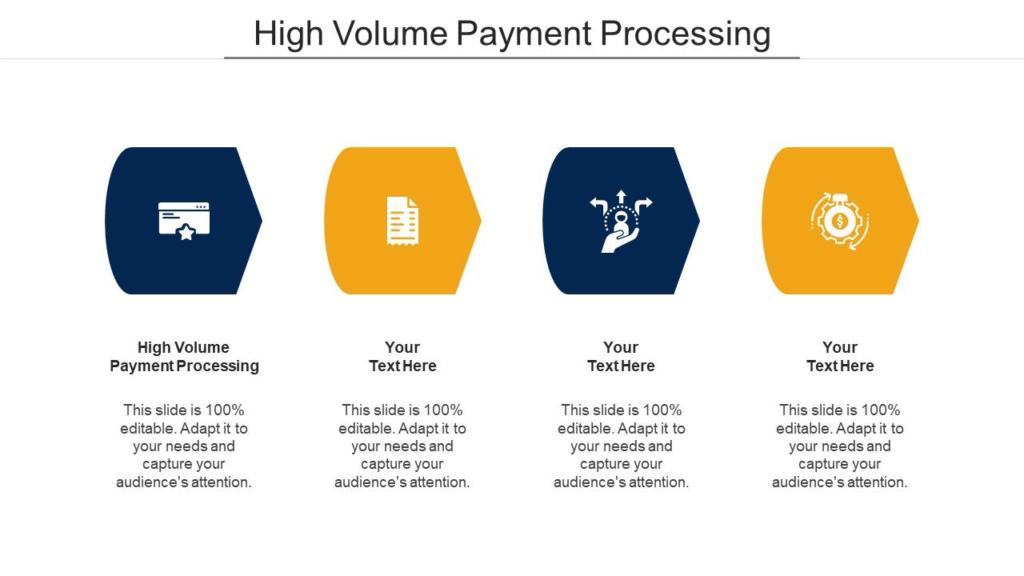AUTHOR : ADINA XAVIER
DATE : 13/09/2023
In today’s fast-paced digital landscape, businesses of all sizes are continually seeking efficient solutions to manage their financial transactions. High volume payment processing[1] has emerged as a crucial aspect of business[2] operations, enabling companies to handle large volumes of payments seamlessly. In this comprehensive guide, we will delve into the intricacies of high volume payment processing[3], exploring its benefits, challenges, and also the latest trends shaping this essential facet of modern commerce
Introduction
Understanding High Volume Payment Processing
High volume payment processing[4] refers to the capability of a business to efficiently handle a large number of financial transactions[5]. These transactions can include online purchases, subscription fees, recurring payments, and also more. As the global economy becomes increasingly digital, businesses are faced with the challenge of managing a high influx of payments securely and swiftly also.
The Importance of Efficient Payment Processing
Enhancing Customer Experience
Efficiency in payment processing can significantly impact the customer experience. Slow or unreliable payment systems can lead to frustrated customers and also abandoned shopping carts. Streamlining the payment process ensures a smooth and also hassle-free experience for buyers, increasing the likelihood of repeat business.

Optimizing Cash Flow
Effective payment processing[1] also contributes to improved cash flow management. With high volume processing, businesses can ensure that funds are deposited promptly, reducing cash flow gaps that can hinder growth and also operational stability.
Key Players in Payment Processing
To embark on a journey of efficient payment processing, businesses often collaborate with key players in the industry:
Payment Gateway Providers
Payment gateways act as intermediaries between the business’s website and the financial institutions involved. They facilitate secure transactions and play a vital role in authorizing payments.
Merchant Account Services
Merchant account[2] providers enable businesses to accept payments through various channels, including credit cards, debit cards, and also digital wallets. Choosing the right merchant account service is crucial to streamline payment processing.
Choosing the Right Payment Processor
Selecting the appropriate payment processor is a critical decision for businesses. Several factors should be considered:
Factors to Consider
- Transaction fees
- Integration options
- Security measures
- Scalability
- Customer support
Comparing Service Providers
Comparing different service providers based on these factors ensures that businesses make informed choices that align with their specific needs.
Security in High Volume Payment Processing
Ensuring the security of payment processing is paramount:
PCI DSS Compliance
Businesses must adhere to Payment Card Industry Data Security Standard (PCI DSS) guidelines to protect sensitive customer data during transactions.
Fraud Detection and Prevention
Robust fraud detection and prevention mechanisms are essential to safeguard against unauthorized transactions and also data breaches.
Scaling Your Payment Processing
Preparing for business growth is essential in high volume payment processing:
Preparing for Growth
Anticipating increased transaction[3] volumes and planning for scalability is crucial to prevent system overload during peak periods.
Scalable Solutions
Choosing payment processing solutions that can seamlessly grow with your business helps maintain efficiency even as transaction volumes increase.
The Role of Technology
Technology plays a pivotal role in modern payment processing:

Integration with Business Systems
Integrating payment processing with other business systems streamlines operations and enhances data accuracy.
Mobile Payment Processing
With the rise of mobile commerce, businesses must offer secure andalso convenient mobile payment[4] options to cater to an increasingly mobile-savvy customer base.
Costs and Fees
Understanding the cost structure of payment processing is essential:
Understanding Pricing Models
Payment processors employ various pricing models, including flat-rate fees, tiered pricing, and also interchange-plus pricing. Understanding these models helps businesses choose cost-effective solutions.
Hidden Costs to Watch Out For
Beware of hidden fees, such as chargeback fees and termination fees, which can impact the overall cost of payment processing.
Challenges in High Volume Payment Processing
While high volume payment processing offers numerous advantages, it comes with its own set of challenges:
Handling Peak Loads
During peak sales periods, businesses must ensure their payment systems can handle the increased traffic without delays or failures.
International Transactions
Processing international payments[5] introduces complexities such as currency conversion and compliance with different regulations.
Emerging Trends
The payment processing landscape is continuously evolving. Stay ahead by embracing emerging trends:
Contactless Payments
Contactless payment methods, such as NFC-enabled cards and mobile wallets, are becoming increasingly popular for their speed and convenience.
Blockchain and Cryptocurrency
The adoption of blockchain technology and cryptocurrencies is opening new possibilities for secure and transparent payment processing.
Case Studies
Learn from the success stories and lessons learned by businesses that have mastered high volume payment processing.
Best Practices
Discover best practices for optimizing payment processing and ensuring customer data protection.
The Future of High Volume Payment Processing
Explore predictions and projections for the future of payment processing and how businesses can prepare for what lies ahead.

Conclusion
In today’s digital age, high volume payment processing is indispensable for businesses looking to thrive in a competitive marketplace. Efficient payment processing enhances customer satisfaction, optimizes cash flow, and positions businesses for growth. By staying informed about the latest trends and adhering to best practices, businesses can navigate the evolving landscape of payment processing successfully.
Frequently Asked Questions (FAQs)
- What is high volume payment processing? High volume payment processing refers to the ability of businesses to efficiently manage a large number of financial transactions, such as online payments and subscriptions.
- How does efficient payment processing benefit businesses? Efficient payment processing enhances the customer experience, optimizes cash flow, and supports business growth.
- What factors should companies take into account when deciding on a payment processor for their needs?Factors to consider include transaction fees, integration options, security measures, scalability, and customer support.
- What are the key security measures in payment processing? Key security measures include PCI DSS compliance and robust fraud detection and prevention mechanisms.
- What are the emerging trends in payment processing? Emerging trends include contactless payments and the adoption of blockchain technology and cryptocurrencies





